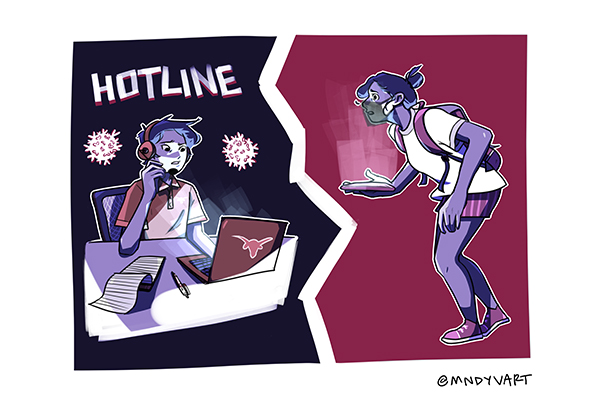The Behavior Concerns and COVID-19 Advice Line is giving advice on COVID-19 concerns, available UT resources and proper behavior during the pandemic for students, faculty and staff.
BCCAL, which was previously the Behavior Concerns Advice Line and gave advice on behavioral concerns, will now also help community members learn information about UT’s response to COVID-19. BCCAL added COVID-19 information to its services in August.
Students, faculty and staff can contact BCCAL via phone at 512-232-5050 or online via the behavior concern form. BCCAL also offers a question form specifically for concerns related to COVID-19, according to the Campus Safety website. BCCAL staff members are available 24 hours a day for behavior concerns, and 8 a.m. to 6 p.m. Monday through Friday for COVID-19 questions.
BCCAL can help with inquiries about the Protect Texas Together app, questions about testing and contact tracing, and self-quarantine assistance, according to the website.
BCCAL exists to support and educate students, faculty and staff and not punish them, said Kelly Soucy, director of Student Emergency Services.
“We try to get the community to call BCCAL first so we can intervene with education, support services, those kinds of things before sanction is required,” Soucy said.
If staff or faculty members call with concerns about their peers, BCCAL would work with the Employee Assistance Program to resolve conflicts so they don't have to be reported to Human Resources, Soucy said. Student concerns are processed through the Office of the Dean of Students.
As of Tuesday, BCCAL has received 68 phone calls or emails since Aug. 21, Sara Kennedy, director of strategic and executive communications for the Office of the Dean of Students, said in an email. BCCAL has also received 34 online inquiries since Aug. 21, she said.
Kennedy said staff have received reports from students about experiences with the after-hours BCAL service such as staff members dismissing concerns or not taking concerns seriously. She said staff have worked to revamp response criteria to ensure service quality in response to such concerns since 2018.
“For the new expanded BCCAL, five staff positions were created to support COVID-19 questions and concerns,” Kennedy said.
Finance senior Harin Sabhaya said the creation of BCCAL was a good move to disseminate important information about testing. However, he said he thinks resources such as BCCAL are not advertised well.
“The messaging from the University hasn’t been very consistent,” Sabhaya said. There are so many different names for all the resources they’re creating, (and) it’s hard to understand what’s for what.”
Kennedy said she understands students may not yet have learned about BCCAL in the current environment, but she said BCCAL staff is working to spread awareness of the line.
“Our staff are exploring all options to help promote this resource so that we’ll be better able to support our community throughout the pandemic,” Kennedy said.
Soucy said BCCAL collaborates with the Counseling and Mental Health Center, the Employee Assistance Program and the UT Police Department.
Business freshman Melody Zhao said students have to take the initiative to use these resources in order to protect the community.
“I definitely would call (BCCAL),” Zhao said. “I think that they would be able to answer a lot of the questions if I were to have some concerns. I don’t think that a lot of people are informed about the testing sites or where they can get help if they have symptoms.”
Editor's note: This story has been corrected to reflect that BCCAL staff members are available 8 a.m. to 6 p.m. Monday through Friday for COVID-19 questions, not 24/7. The story has also been corrected to better reflect a quote and information from Kelly Soucy about sanctions and the Employee Assistance Program. Lastly, the story has been corrected to clarify that staff have revamped BCAL in response to concerns since 2018. The Texan regrets these errors.





















